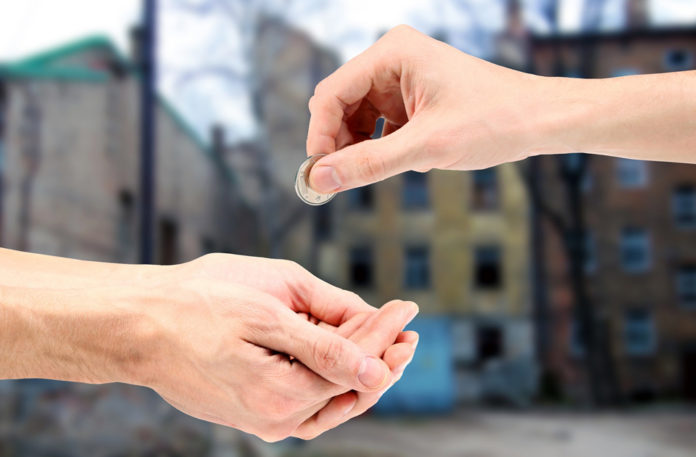To give from ones wealth in charity is from one of the greatest actions that Allâh has blessed the Muslim Nation with. To spend in charity or sadaqah as it is known, has been mentioned in numerous Qur’ânic verses and Prophetic narrations. Its importance and necessity simply cannot be emphasised enough for as the Prophet ( sallallâhu ‘alayhi wa sallam) said, “ Sadaqah is a proof” [1] i.e. to give in charity actually proves a person’s religion and faith, and especially their with Allâh which means ‘truthfulness and sincerity’ with ones Lord.
Allâh ‘azza wa jall says in His Noble Book:
| O you who believe! Spend of that with which We have provided for you, before a Day comes when there will be no bargaining, nor friendship, nor intercession. And it is the disbelievers who are the Wrongdoers. [al-Baqarah 2:254] |
| O you who believe! Spend of the good things which you have (legally) earned, and of that which We have produced from the earth for you, and do not aim at that which is bad to spend from it, (though) you would not accept it save if you close your eyes and tolerate therein. And know that Allâh is Rich (Free of all needs), and Worthy of all praise. [al-Baqarah 2:267] |
| Believe in Allâh and His Messenger, and spend of that whereof He has made you trustees. And such of you as believe and spend (in Allâhs way), theirs will be a great reward. [al-Hadeed 57:7] |
The Messenger of Allâh ( sallallâhu ‘alayhi wa sallam) said, “There is no day in which the slaves of Allâh arise except that two angels descend, one saying, “O Allâh, replace the charity for the one who spends!” whilst the other says, “O Allâh, destroy the wealth of the one who holds back (from giving in charity)”. [2]
He also ( sallallâhu ‘alayhi wa sallam) said,
| “O Son of Adam, if you spend from that extra you have been given (above and beyond your basic needs), it will be much better for you. If you withhold it, it will be bad for you. There is no blame upon you if you have just what is sufficient for your needs, but know that the upper hand (which gives in charity) is better than the lower hand (which receives charity).” [3] |
Once, the Prophet ( sallallâhu ‘alayhi wa sallam) had a sheep slaughtered and then asked ‛A’ishah ( radhy Allâhu ‘anhâ) what was left of it. She replied, “There is nothing left but the shoulder.” The Prophet (sallallâhu ‘alayhi wa sallam) said, “All of it remains except the shoulder ”[4] i.e. meaning that he had given the entire sheep as charity except the shoulder. The act of giving the whole sheep bar the shoulder will remain as the true profit realised.
This reality is often very difficult for people to grasp that whatever one gives in charity is something which will be a huge source of reward for its giver and this is the real way to spend our wealth. If we don’t, well, look when the Prophet ( sallallâhu ‘alayhi wa sallam) said,
| “The Muslim says, ‘All my wealth, all my wealth!’ whereas he only really has three parts to his wealth: That which is eaten, and so it is consumed. That which is worn, and so it wears out. And that which is given in charity, for this is stored for him. Anything other than that will whither away to be left for the people behind him.” [5] |
Allâh ‘azza wa jall says in the Qur’ân:
| “Never will you attain righteousness until you spend from that which you love. And whatever you spend, indeed Allâh is Knowing of it.” [Âle-‘Imran, 3:92] |
We must realise how desperate we are in need of forgiveness for our wrong actions and our dire need for good deeds to help weigh up our scales. One would do well to consider the following Prophetic advice for that Day when no single thing shall be forgotten.
The Prophet ( sallallâhu ‘alayhi wa sallam) said,
| “There is no one of you except that Allâh will speak to him, without any interpreters. He (the person) will look to his left and right surrounded by the Fire and realise that he might only be saved by the good deeds he did before, then he will look forward and the fire will be directly in front of his face, so (O Muslims) save yourself from the Hellfire even if it is by half a date!” [6] |
He also said, “O ‛A’ishah, save yourself from the Hellfire even by giving half a date!” It is well known how profoundly affected she was by this, and the example set by the Mother of the Believers ( radhy Allâhu ‘anhâ) in giving from all her wealth in charity after the death of the Messenger ( sallallâhu ‘alayhi wa sallam) is something indeed to behold.
The Prophet ( sallallâhu ‘alayhi wa sallam) once said,
| “O Ka’b ibn ‘Ujrah! Prayer is an offering (to Allâh), Fasting is a shield, and Sadaqah extinguishes sins as water extinguishes fire. O Ka’b ibn ‘Ujrah! People are of two kinds: One who buys and keeps himself and thereby is destroyed and the other who sacrifices himself and is thereby freed.” [7] |
Here the Prophet ( sallallâhu ‘alayhi wa sallam) illustrates that real freedom and success does not come by buying up the dunya but rather the sacrificing of that which is beloved for the love of the Hereafter. The one who takes this temporal world as his delight and true objective will only purchase delusion therein; it will ultimately destroy him. We ask Allâh for pardon and forgiveness.
It is well known from the Sunnah and the actions of the early pious generations that if they committed any mistake, bad deed, or anything perceived by them to be unworthy behaviour, they would always pay some sadaqah as an ‘expiation’ for their behaviour. One can never imagine the impact that a very small act of kindness at a critical moment can have!
Abdullâh ibn Mas’ûd ( radhy Allâhu ‘anhu) narrates,
| “There was once a pious man who worshipped Allâh from his chamber for sixty years before a woman came to him and he was tempted into spending six illegal nights with her. Once the gravity of his sin dawned upon him, he fled until he came to a Mosque wherein he took refuge for three days, without food or drink, except a bread roll which he broke into two pieces giving half to a man on his right and the other half to a man on his left. Allâh sent the Angel of Death to take his soul at that moment, and his Accounting started as the sixty years of worship were placed on the scale versus the six nights the six illegal nights outweighed the worship. Then, the six nights were placed on the scale against the bread roll the bread roll outweighed the six illegal nights.” [8] |
In such a religion of mercy and ease, it is clear that one should never under-estimate the value of small good deeds, especially giving charity, and even more so when you give to others what you might have some need for.
Also, giving Sadaqah doesn’t have to mean making one go poor. The Prophet ( sallallâhu ‘alayhi wa sallam) said,
| “Whoever gives the amount of a date in Sadaqah from good halal earnings – and know that Allâh does not accept but that which is good Allâh will accept it with His Right Hand and will nurture the Sadaqah for its giver as you nurture your young colts, until the Sadaqah becomes like the Mount of Uhud.” [9] |
In another narration, Abu Hurayrah ( radhy Allâhu ‘anhu) narrates that the Prophet ( sallallâhu ‘alayhi wa sallam) said,
| “The best charity is that which when given, still leaves the giver self-independent for the upper hand (that continually gives) is better than the lower hand (which continually takes) so start with those who are dependent upon you.” [10] |
In explanation, Abu Hurayrah ( radhy Allâhu ‘anhu) continues saying, “ because your wife will say, ‘Spend on me or divorce me.’ Your servant will say, ‘Spend on me or sell me.’ Your child will say, ‘Who will look after us?’
One can see that the intention to do good is the key element here, even if one gives little, as long as it sincerely for the Sake of Allâh. Our Lord doesn’t want us to give everything up so that we have to beg from others! If one did, how would one cope with the above demands from the people that are dependent upon us?!
The huge reward to be earned in giving charity is not just the remit of the very rich. The Prophet ( sallallâhu ‘alayhi wa sallam) said, “One dirham has become greater than a hundred thousand dirhams.”The companions asked, “How can that be O Messenger of Allâh?” He replied, “A rich man takes a hundred thousand dirhams from his wealth and gives it away as Sadaqah. Another man has nothing except two dirhams, and so he takes one dirham and gives it away in charity.” [11]
The Prophet (sallallâhu ‘alayhi wa sallam) also said, “Indeed Allâh accepts what is given as Sadaqah, taking it in His Right Hand, nurturing it for you as you nurture your colts, until a small amount becomes as large as Uhud ” [12]
He also said,
| “Wealth is never diminished by giving sadaqah.” [13] |
We have numerous excellent examples of how selfless the noble companions ( radhy Allâhu ‘anhum) used to be, living daily lives of sacrifice leaving behind for themselves and their families just enough to get by showing us how to find real purpose in our lives. The generosity of Abu Bakr is legendary as is that of ‘Umar b. al-Khattâb. What of the other companions?
Mâlik ibn Dînâr narrates that ‘Umar ibn al-Khattâb ( radhy Allâhu ‘anhu) took four hundred dinars and placed them in a purse. He called his servant and said to him, “Go and take this money to Abu ‘Ubaydah ibn al-Jarrâh, then keep yourself busy in his house for a while and see what happens.”
The servant went to the house and said to him, “The Leader of the Believers has said to you, ‘Use this to fulfil any of your needs’. Abu ‘Ubaydah (radhy Allâhu ‘anhu) said, “May Allâh preserve him and have mercy upon him!” Then he said, “O maidservant! Take this seven dinars to so and so, take this five dinars to so and so, take this five dinars to so and so ” until he had spent it all. The servant then returned back to ‘Umar and informed him of what happened, and found ‘Umar had prepared a similar amount for Mu’âdh b. Jabal (radhy Allâhu ‘anhu), and so he said to his servant, “Go and take this money to Mu’âdh b. Jabal and make yourself busy in his house for a while and see what happens.”
The servant went to him and said, “The Leader of the Believers has said to you, ‘Use this to fulfil any of your needs’. Mu’âdh said, “May Allâh preserve him and have mercy upon him!” Then he said, “O maidservant! Take such amounts to so and so’s house, and take such amount to so and so’s house” upon which Mu’âdh’s wife exclaimed, “By Allâh! We are poor! Leave some for us!” There was nothing left in the purse except two dinars so Mu’âdh threw them towards her for her to keep. The servant returned to ‘Umar and informed him of what had happened, whereby he smiled happily and said, “Indeed they are brothers; one of a kind.” [14]
We find ourselves in difficult times, both individually and as a Nation. The poor are simply becoming poorer and more desperate, with war and famine raging in our Lands like an insatiable fire. Personally we in the richer countries are being hit with less work but higher living costs, increased mouths to feed, and a never-ending amount of requests for donations for all types of Islamic charity needs, establishments, mosques, madrasahs and on and on. One senses that people are getting tired of giving, something termed ‘Charity Fatigue’…
My fellow Muslims, Islam doesn’t recognize such a concept. We can not become fatigued from giving from that which we have been given as a trust i.e. our wealth. Islam doesn’t allow Muslims to force themselves into poverty but that does not apply to 99% of us here in the Western countries. One of the greatest responsibilities of life is to ensure that we do the right thing with the money we earn giving it away as charity is clearly the greatest continual action one can do with it until we enter a grave where that money will be of no avail.
We should conclude that to give Sadaqah will be a proof of ones faith and commitment to Allâh. It is the expiator of our mistakes, and a very small amount can bring unimaginable spiritual and material rewards, both in this life and in the Hereafter. It protects one from the Fire of Hell and extinguishes our sins. It leads to blessings in the wealth one has in this world as well as the best possible investment in the Hereafter, personally managed by the best of advisors, Allâh the Almighty, the Most Merciful.
Don’t you think then that giving Charity should start right here and now?
| “Say, ‘Indeed, my Lord extends provision for whom He wills of His servants and restricts (it) for him. But whatever thing you spend (in His cause) He will compensate it; and He is the best of Providers.” [Saba’, 34:39] |
1 Muslim
2 Bukhâri and Muslim
3 Muslim and Tirmidhi
4 Tirmidhi and he graded it Hasan Sahîh
5 Muslim
6 Ahmad with a sahîh isnâd
7 Abu Ya’la with a sahîh isnâd
8 Bayhaqi. This is a sahîh mawqûf narration of ibn Mas’ûd
9 Buhkâri and Muslim
10 Ibn Khuzaymah. Albâni graded it sahîh
11 Nasâ’i and ibn Hibbân who graded it sahîh
12 Mâlik’s Muwatta’
13 Bukhâri
14 Tabarâni. Albâni graded it a Hasan Mawqûf report.
(NOTE: If you want to build a strong and powerful relationship with Allah, check out Islamia TV, where you can watch Islamic speakers from across the globe deliver inspiring and motivational courses. Learn more at www.islamia.tv.)




![[Video] THIS is why you should thank a beggar…](https://islaam.net/wp-content/uploads/2017/01/15870023_1238136699567456_580192013731758080_n-3-218x150.jpg)

















